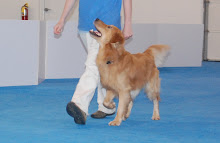I get together with a trainer friend at a local park. It's amazing to have someone nearby to work with on such a regular basis. We meet a couple times a week and it's just so great to get me out and working and to have help. We tend to see the same people come to the park. The group of joggers. The people emptying the trash. And someone else who stops by every morning on an errand. After a few months, this person stopped to greet us and ask a question.
The person works at peoples homes....and one place recently added a very (very) large breed dog to the home. The dog would growl and bark and be unfriendly towards this person and other visitors. The owners had been notified. The person would bring dog treats and wanted tips. I stepped in with something like, "You must have the owner keep the dog put away while you are there. It is not safe." The person said that they'd had a conversation..... and that the dog had pinned him against a wall before. "You need to insist that the dog is put away. That is not safe for you. It's not good for the dog to be stressed either, tell the owners you're worried about the dog. If they want help, they can call us. Otherwise, be safe."
We haven't seen the person since then, but I sincerely hoped he took our advice. Why didn't I give training tips or mention how bad it is to be hand feeding treats to a nervous dog?
1) Liability. There was nothing in place to keep me safe and it's not a safe situation.
2) The owners were not on board. The primary caretaker has to be on the same page.
3) This person has good intentions! Going out of his way to buy treats! I want to prevent the person from having more bad experiences with dogs.
4) Safety!! A dog that is pinning someone against a wall should not be loose while there are visitors. It's just not safe.
5) Multiple concerns. It's not just with this one person, but all visitors. There are likely other anxiety issues as well.
This week, on a few discussion lists there was talk of food and nutrition, and visitors in households not treating dogs well and rescue groups asking for help in situations where a veterinarian should be involved.
Most dog trainers very much have a "helping-people-thing," and really do want to help. And in such an un-regulated field, we aren't always good at policing ourselves and knowing whether or not we cross lines is impossible when the lines aren't well defined. This year I've heard a few really great examples of trainers who understand the lines and a few examples of people who weren't aware there are things a trainer should not do or say. It'll be interesting to see how this changes in the future.





No comments:
Post a Comment